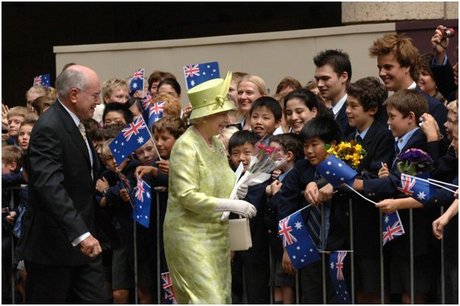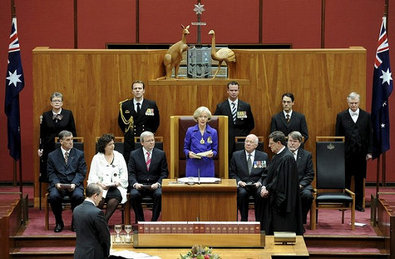Benefits of Constitutional Monarchy

For over a century, our Australian Constitution has worked unobtrusively in the background ensuring that our young nation remains democratic and free. It is a hundred years younger than the American Constitution, and far less cumbersome and politically invasive. In its more than a century of existence as a nation, Australia has had no civil unrest and no constitutional crisis and has an unparalleled record of political and economic stability which have ensured the development of our new nation into the magnificent country it is today. We are recognised as the seventh oldest continuous democracy and are often listed within the top five developed nations of the world.
Every Governor-General, since 1965, has been an Australian citizen. The Governor-General, Her Excellency Quentin Bryce AC, is the effective Australian Head of State, recognised under international law. When he or she visits another nation representing the Commonwealth of Australia, the Governor-General is received as such. A High Court decision handed down in 1907 by Sir Samuel Griffith – one of this nation’s founding fathers – found that Australia has six effective Heads of State (the State Governors), and one effective Head of the Commonwealth (the Governor-General). The Queen is the Sovereign of Australia.
The Australia Act of 1986 severed the last ties to the ‘old country’, and fully established the identity that is the Australian Crown. A process to establish a separate, ‘Australian Crown’ was commenced by the Whitlam Government in 1973 through the Royal Style and Titles Act which established Queen Elizabeth II as “Elizabeth the Second, by the Grace of God Queen of Australia and Her other Realms and Territories, Head of the Commonwealth”. In Australia, Her Majesty Queen Elizabeth II is no longer the Queen of Great Britain, or the United Kingdom, or of England to us anymore... She has a distinctly Australian character under our law. She is now, essentially, Australian.
Cost
There are absolutely no rational grounds for becoming a republic, but there are many logical and sound reasons for remaining as we are, not the least of which is our proven system of stable and secure government under our Australian Constitutional Monarchy. Of course there is the financial cost of changing to a republic. Committees, conventions and enquiries on the issue of a republic from 1993 to now have cost over $100 million. If republicans get their way, the cost of holding additional referenda (each State's would have to hold a referendum to alter the States constitution from a constitutional monarchy to a State Republic – this means 6 additional referenda on top of the national referendum!), plebiscites, committee hearings, changing the national and State flags, Coat of Arms, changes to military and emergency services uniforms and so on would be huge. Estimates range from $1-$3 billion. This is money that could be better spent on health and
education.

- JAPAN IMPERIAL HOUSEHOLD: $44 922 500
- ITALY PRESIDENTIAL ALLOWANCE: $144 883 257
- USA EXECUTIVE OFFICE: $310 441 000
- KUWAIT ROYAL FAMILY: $26 552 000
- AUSTRALIA - THE QUEEN: $0
- - THE GOVERNOR GENERAL: $9 699 314
However, the cost of changing to a republic is not just financial.
Risk to Democracy
In all republics the Prime Ministers and Presidents are political appointees, beholden to politicians and political ideology, but under our system of Constitutional Monarchy the monarch, presently HM The Queen, occupies an hereditary position and the Governor-General, although recommended by the Prime Minister, is appointed by the Monarch which means that these positions are totally above politics and impervious to political influence – they are ‘impartial’. Under our current system, the Monarch and the Governor-General are checked by the parliament, and the parliament is checked by the Monarch or the Governor-General, the Courts, and by the people. Under our current system of constitutional monarchy, it is impossible for any one person to achieve absolute power. The system runs smoothly, and we do not see here in Australia political stand-offs and stalemates between the Government and our Head of State.
